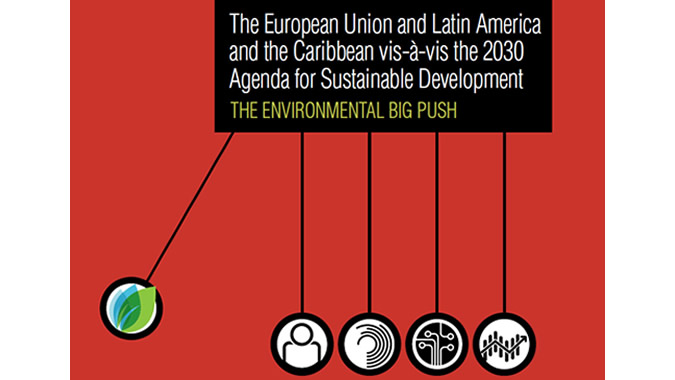video
The complex international scenario —characterized by a distinct recessionary bias, a rise in global inequality and the intensification of the environmental crisis, the acceleration of the technological revolution, the emergence of new actors in the international economic system, and the negotiation of mega-agreements— presents new challenges and opportunities for the countries of the Community of Latin American and Caribbean States (CELAC) and of the European Union, as well as for relations between the two blocs.
This is what the Economic Commission for Latin America and the Caribbean (ECLAC) and the EU-LAC Foundation set forth in a new joint publication that will be unveiled during the Meeting of Foreign Ministers and the XLVIII Meeting of High-Level Officials of CELAC and the European Union, which will be held in Santo Domingo, the Dominican Republic, on October 24-26.
The document entitled The European Union and Latin America and the Caribbean vis-à-vis the 2030 Agenda for Sustainable Development: The environmental big push, produced with the European Union’s support, presents an overview of the economic, social and environmental realities of both blocs, placing emphasis on the need to move towards a more sustainable and egalitarian development pattern, as well as towards an investment model that favors innovation and structural change and allows for economic growth and carbon emissions to be decoupled.
The study indicates that it is a propitious time for the European Union and Latin America and the Caribbean to generate an environmental big push that enables a move towards new investment patterns that favor innovation and structural change, and allow for economic growth and carbon emissions to be decoupled. In that way, countries will make progress towards a new development paradigm that is more sustainable and egalitarian.
According to the publication, the changes in the international context are reflected, foremost, in the slower pace of economic growth. For example, for the first time in a decade, Latin American and Caribbean countries are growing at lower rates than nations in the European Union: in 2016 the region’s Gross Domestic Product is expected to fall 0.9%, while that of the European Union is seen rising by 1.8%, which reduces the chances of narrowing the income gaps per inhabitant with countries of that region.
In trade matters, the document highlights that the European Union is one of the region’s most important partners, as well as its top investor. It also indicates that European companies have become key actors in the rise in Foreign Direct Investment that could drive the 2030 Agenda, supporting the creation of infrastructure, the digital economy and clean-energy production.
On environmental issues, Latin America and the Caribbean has already reached annual greenhouse gas (GHG) emission levels similar to those of the European Union, despite its lower degree of development. In fact, European GHG emissions have fallen on average 0.8% annually since 1990, while in Latin America and the Caribbean there has been a sustained annual rise of 1.1%, which, nonetheless, is one of the lowest increases among emerging regions.
The document contributes to the discussion that authorities and officials will have in the Dominican Republic, as they seek to address the shared challenges of the current international and regional scenario. In this high-level dialogue, they will analyze the solutions that both regions can contribute to this new global context, which is characterized by deep economic, social and environmental imbalances, as well as by new elements, such as large-scale migratory movements. This meeting will take place in preparation for the III Summit of Heads of State and Government of CELAC and the European Union, which is due to be held in 2017.

